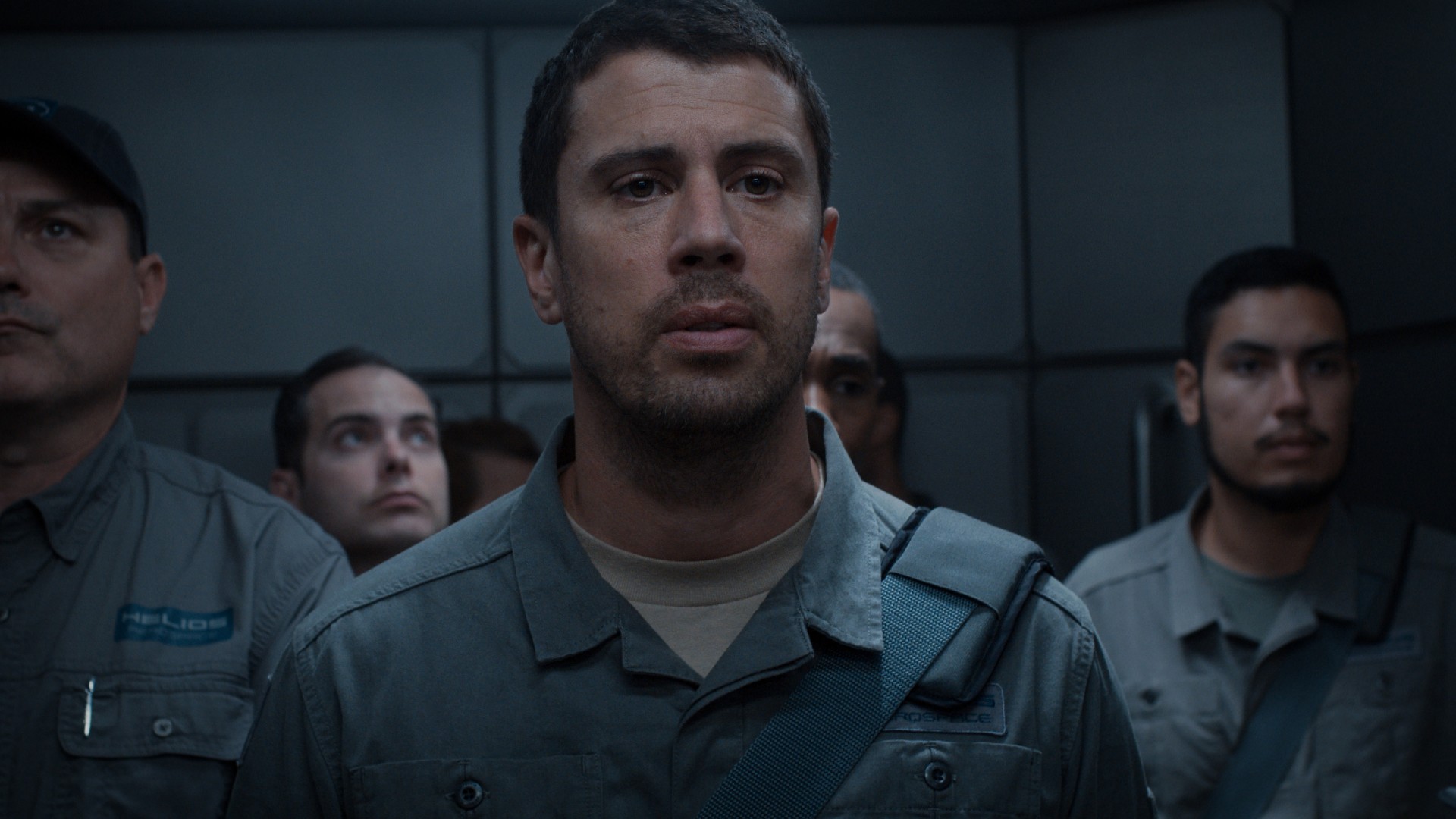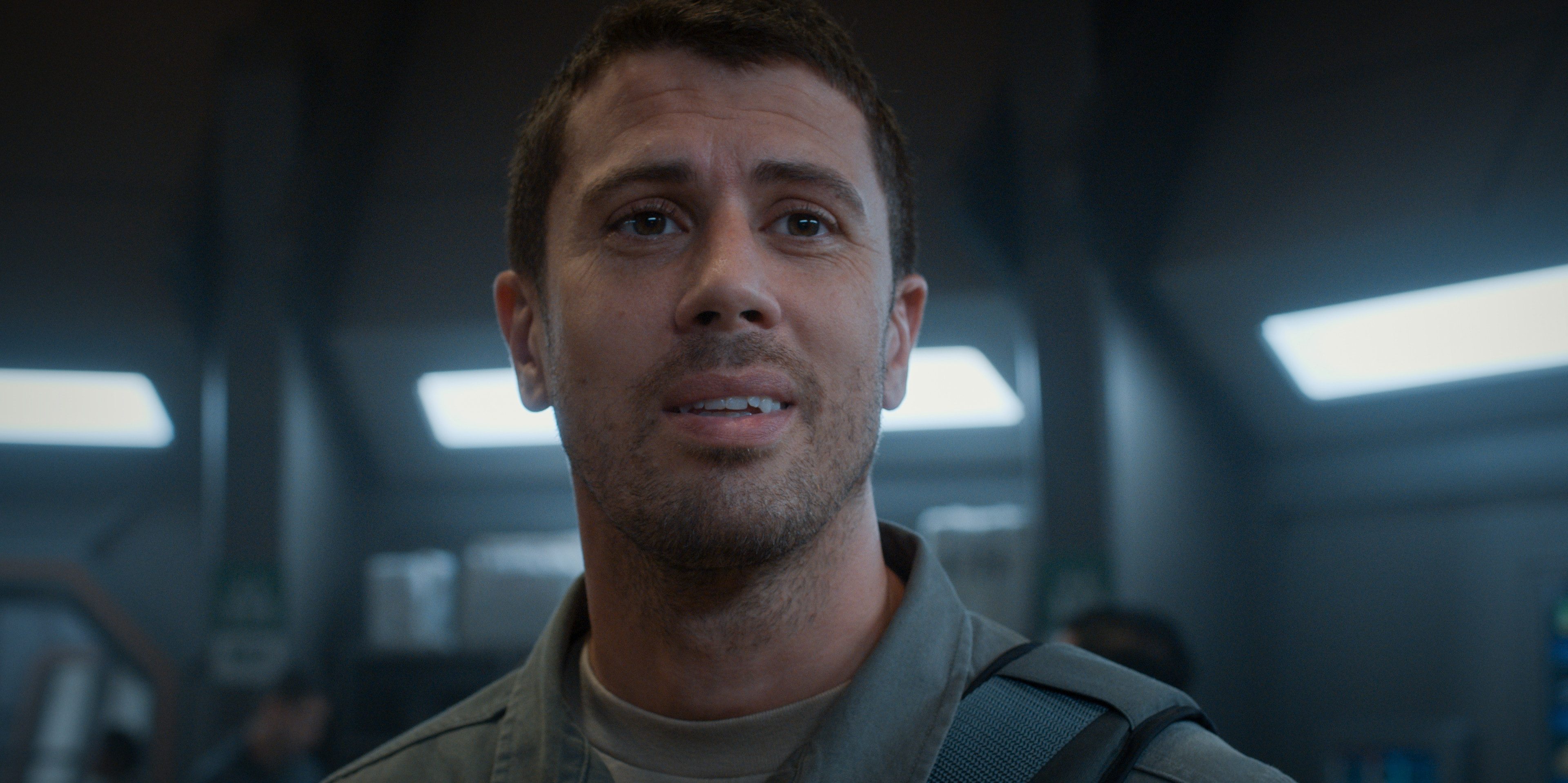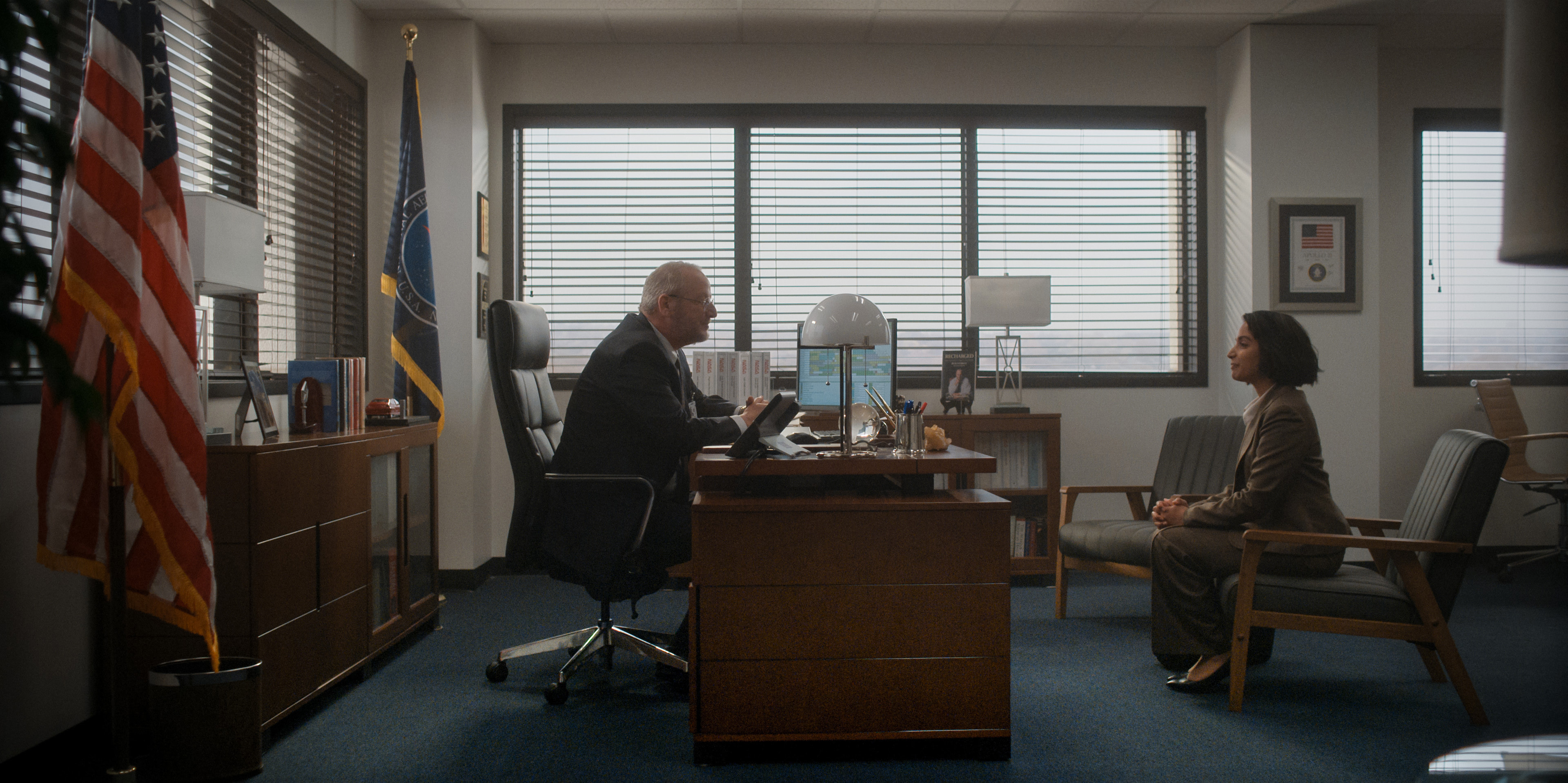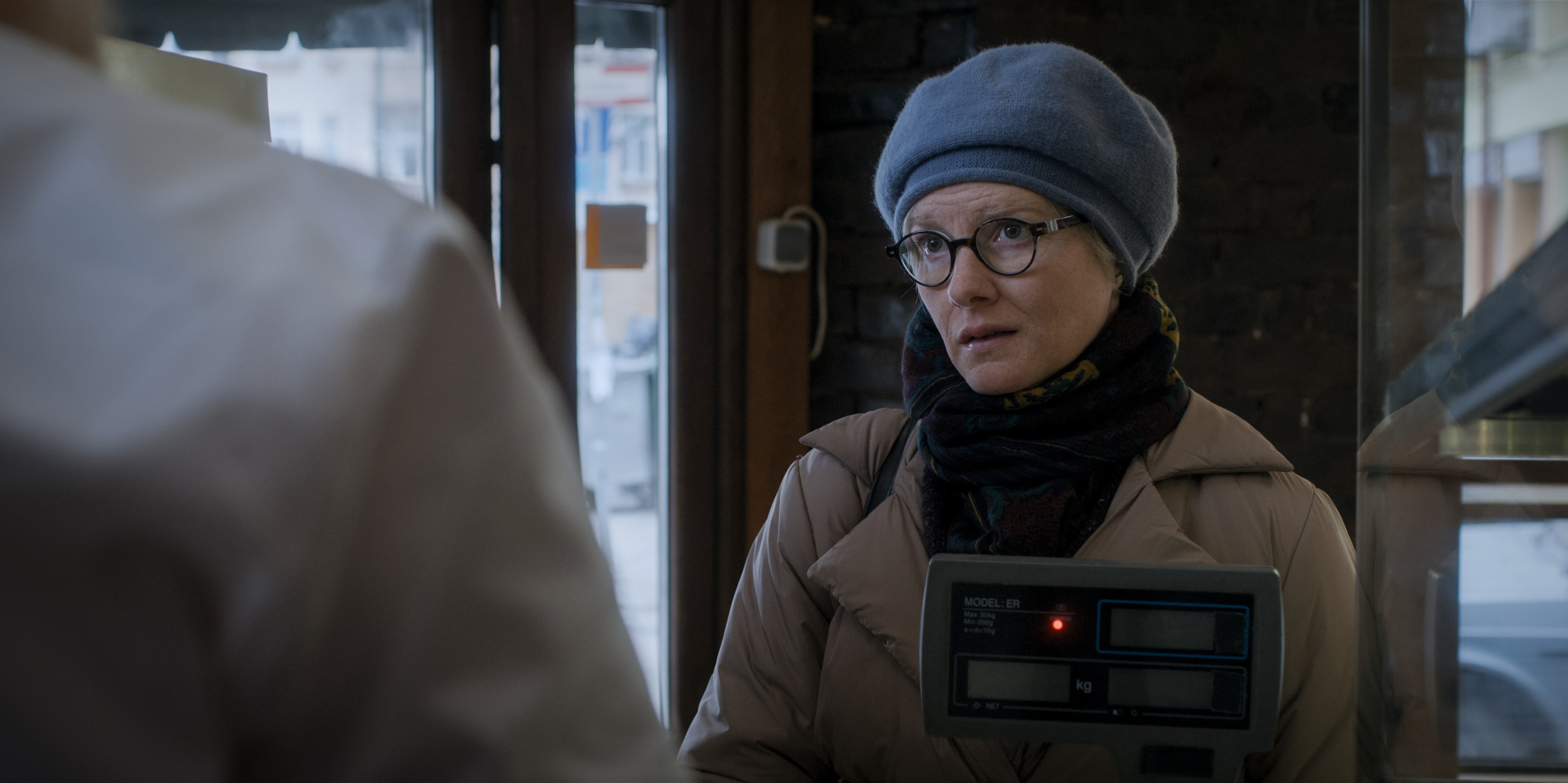
Like any "For All Mankind" season opener, last week's "Glasnost" had a big job to do setting the scene after the now-prerequisite time jump. With that nuts-and-bolts work out of the way, however, follow-up episode "Have a Nice Sol" is free to get on with telling its alternative history of the early 21st century – and it does so in spectacular style.
Having made his debut last week, series newcomer Toby Kebbell more than justifies his place at second on the cast list with an excellent performance as Miles Dale. In a show that has, up to now, predominantly focused on heroic astronauts and scientists at the forefront of the space race, the presence of an ordinary guy trying to make ends meet adds an intriguing new dynamic to the show. It's also an excuse to further explore the conflicts between the private and public sectors that fuelled much of season 3.
But beyond all that, "Have a Nice Sol" is a brilliant drama that gets under the surface (quite literally) of the Mars base at Happy Valley, and shakes up the status quo for several of the show's core characters. It also finds triumph (albeit small ones) in the most unlikely places.
Related: 'For All Mankind' season 4 episode 1 review: Lots of moving parts but light on plot
Spoilers ahead for "For All Mankind" season 4 episode 2: "Have a Nice Sol"
From the Rolling Stones to David Bowie and Nirvana, "For All Mankind" has always had the knack of picking the right song for the occasion. The opening of "Have a Nice Sol" is plays out to "The Modern Age" by the Strokes, and it's the perfect soundtrack to a glorious sequence set in the skies above Mars. With the Unity spacecraft now safely installed in orbit after its two-month voyage from Earth, we see a landing vessel making a spectacular approach to the Happy Valley base. It's easy to see why Martian first-timer Miles Dale (Toby Kebbell) is recording the occasion on his early-'00s digital camera.
But it doesn't take long for the episode to bring everyone back down to Earth — or, rather, Mars. Palmer James (Myk Watford), Helios's director of human services, performs the necessary briefing/plot exposition, detailing the harsh realities of life on the red planet, while pointing out Happy Valley's ATMs and explaining that the Martian day (or sol) is 2.75% longer than Earth's. (Residents are given a bespoke watch as part of their welcome pack.) And by the time the new recruits take an elevator to their lodgings three floors underground, Miles' sense of wide-eyed wonder has turned to palpable trepidation.
Understandably so, seeing as the subsequent tour of Happy Valley's extremely unglamorous lower decks feels like a cross between a field trip to the rebooted "Battlestar Galactica", and the set-up for a sci-fi horror movie. Indeed, as James reminds the rookies to remember where emergency equipment is kept, and that the adjacent North Korean compound is strictly out of bounds, you can't help thinking that both pieces of information could prove to be extremely important later in the season.
There's further disappointment for Miles when he learns that his two-year posting to Mars is going to be spent carrying out maintenance on the base, rather than getting out on the Martian surface as a fuel tech — apparently fuel production is no longer a priority after last week's asteroid incident. A condescending "Have a nice sol" from James is Miles' reward for his protests.

When new base commander Danielle Poole (Krys Marshall) and long-serving executive officer Ed Baldwin (Joel Kinnaman) greet each other with the traditional "hi Bob" catchphrase from their days on the moon decades earlier, the contrast couldn't be starker. The ingenious split screen sequence that follows is the highlight of the episode, tracking Poole and Miles going through their very different day-to-day routines at Happy Valley, before seamlessly bringing them together in a single elevator shot. While Poole lives in palatial quarters, gets coffee brought to her, and has the ear of everyone on the base, Miles is forced to live on a loose approximation of food, is ignored by the people he works for, and — perhaps worst of all — realizes that the internet signal in his room won't allow him to watch video messages from his family.
Back on Earth, Ed's exobiologist daughter Kelly (Cynthy Wu) demonstrates Spot, a prototype robot designed to locate microbial life on Mars. NASA boss Eli Hobson (Daniel Stern) seems suitably impressed with her team's "remarkable work" but — cementing his reputation as a budget slasher — he tells her there's no money to spend on scientific research like hers. At least, the cash well will remain dry until the asteroid capture program is back up-and-running. "No bucks, no Buck Rogers," Kelly surmises.
She's unlikely to look for any advice from her old man, seeing as she's yet to acknowledge his message tell her he's not coming back from Mars any time soon. This episode confirms that Ed hasn't been to Earth in eight years – not since his ex-wife, Karen, died in the Johnson Space Center bombing – and strongly implies that he has little intention of ever doing so.
The Houston terrorist atrocity also continues to weigh heavily on NASA flight director Aleida (Coral Peña), who hasn't been into work since the asteroid disaster that killed cosmonaut Grigory Kuznetsov and contractor Tom Parker. When Aleida's husband finds her repairing a faulty TV at 3:30 a.m., it's clear that things are far from okay, and when she meets Eli soon after with the intention of returning to the office, she ends up handing in an abrupt resignation.

The underlying problems on Mars, meanwhile, are becoming more and more pronounced. Under previous management, the divisions between the elite astronauts on the surface and the "help" below them have been allowed to grow, and resentment is festering. A privileged few sharing the spoils of space, while unseen masses put in the hard yards is clearly going to be a major theme of this season, and it's an intriguing — and allegory-heavy — contrast to the pioneer spirit of the show's early years.
While many on base are wearing patches with Grigory's initials, Parker is barely mentioned. "Sounds like he died a real hero," says Miles, who now occupies Parker's bunk. "No," counters his friend, Joanna Chapman (Rhian Rees). "He did it for the bonus. Money for his family. And now he's maggot meat."
Ed Baldwin is a major part of the problem. As a member of the original generation of astronauts, he sees hardship and suffering as an integral part of space exploration, and is totally unable to grasp that, for most of Happy Valley's residents, being on Mars is more about the next paycheck than advancing humanity's understanding of the cosmos. Any complaints are subsequently dismissed without hesitation, as Miles later discovers to his cost.
Dani is much more sensitive to the situation, and realizes that fixing the Happy Valley broadband is key to base morale. Despite Baldwin's protestations that fixing a faulty Helios communications satellite is not a priority, she orders an EVA to make repairs. "Well, make it so, XO," she tells him, in a clear nod to "Star Trek: The Next Generation".
After her abrupt departure from NASA, Aleida finds herself in Julio's Tex Mex, a rebranded version of the Outpost bar/restaurant that has been a "For All Mankind" mainstay since day one, and was once owned by Karen Baldwin. There she strikes up a conversation with Kelly, who's gone back to "practically the only landmark left from my childhood" to come to terms with Hobson's rejection. After they've drowned their sorrows with significant quantities of tequila, Kelly winds up sleeping on Aleida's sofa, but an epic hangover isn't the only key takeaway from the evening. Overnight, the insomniac Aleida has formulated a plan for Kelly to take her research project to the private sector — and the engineer intends to join her new-found friend in the venture.
Hopefully they'll be able to secure better terms of employment than Miles and the other Helios staff on Mars, who find their paychecks deducted to the tune of 30% to cover food, uniform, toothpaste and other unavoidable sundry items. In other words, Miles' take home pay is less than he'd be making on Earth, and he can't even think about quitting because it will cost him $150,000 to go home before his contract is up.
Things finally begin to look up when Dani's plan to fix the Wi-Fi pays off. It may seem relatively trivial, but it's a fist-pumping moment to rival some of the series' orbital triumphs. For Miles it means a chance to catch up on a few heartfelt messages from the kids, and — while he never manages to complete a reply — he does get some additional respite from a very strong drink at an illicit below decks bar.
The continuation of Margo's story in the Soviet Union has to wait until last, but it's a significant gamechanger. She wakes up to find nothing but ballet on the TV, and the streets of Moscow strangely deserted. The local baker's warning to "go home" then proves extremely prescient, as Margo finds herself caught up in scenes of police brutality.

With Muscovites asking, "Where is Gorbachev? What have they done with him?", it looks like the 1991 coup that temporarily ousted the Soviet leader — and effectively kickstarted the country's dissolution — is coming to pass more than a decade later. It's a rare example of the more-often future-looking "For All Mankind" following in the slipstream of real-life events, and — after President Al Gore's fictional declaration that the Cold War is over – these developments are bound to have serious ramifications on Earth and Mars.
Following this brilliant episode, the fourth season is properly up and running. It's worth noting, however, that haven't yet seen what Helios founder Dev Ayesa (actor Edi Gathegi is mentioned in the opening credits) is up to in 2003 — his new robotics company is sure to have a big part to play in humanity's continuing exploration of the solar system.







